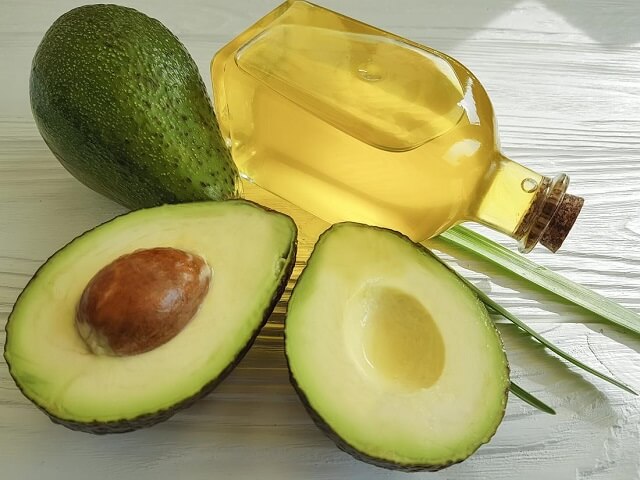Avocado oil is a great option for those looking to add a nutrient-rich and soothing oil into their skincare routine. Cold-pressed from the fleshy pulp of avocados, this oil is considered to be one of the best sources of monounsaturated fats.
It’s rich in antioxidants like Vitamin E and packed with anti-inflammatory compounds that help to reduce skin irritations, including redness and dryness. Avocado oil is also full of fatty acids like oleic acid that helps to make it especially moisturizing and nourishing for our skin.
So now that we know what avocado oil offers in terms of nutritional benefits, let’s answer the primary question:
Is avocado oil non-comedogenic? The short answer is yes – it can be used on acne-prone skin since it’s been shown to not clog pores.
In fact, thanks to its anti-inflammatory properties and ability to nourish skin while locking in moisture, it may even help treat some forms of acne by keeping the underlying cause balanced.
Table of Contents
Introduction to Avocado Oil
Avocado oil is extracted from the flesh of avocados and it is a popular natural beauty product. The oil is said to be good for the skin and hair, as it is rich in vitamins and minerals. Avocado oil is also said to be non-comedogenic, meaning that it does not clog pores.

However, some people may still experience breakouts after using avocado oil, so it is important to test the oil on a small area of skin before using it on your face or body.
Avocado oil has a light, nutty scent and can be used to moisturize skin, reduce wrinkles and acne, treat scalp problems such as dandruff, as well as to nourish and improve the elasticity of the hair.
It is also said to help with healing scars and stretch marks. Many use avocado oil on its own or combine it with other natural ingredients for topical applications. Depending on the area you want to treat, the combination of essential oils might vary.
What is Non-Comedogenicity?
Non-comedogenicity is the term used to describe the ability of a substance not to clog pores. When applied topically, avocado oil has been shown not to clog pores and is therefore considered non-comedogenic.
The term comedogenicity is often used interchangeably with pore-clogging, but there is a slight difference between the two.

Comedogenicity refers to the propensity of a substance to cause blackheads, whiteheads, or other types of acne. Although closely related, pore-clogging and comedogenicity are not the same thing.
The majority of scientific studies on avocado oil have found that it does not cause or aggravate acne. In fact, some studies have even shown that avocado oil can help to treat acne.
How Does Avocado Oil Rate on the Comedogenicity Scale?
If you’re like most people, you probably think all oils are bad for your skin. After all, they clog pores and cause breakouts, right? Wrong! Not all oils are created equal.
In fact, some oils can actually do wonders for your skin. Avocado oil is one of those good-for-you oils. But what exactly is avocado oil and how does it stack up on the comedogenicity scale?
Avocado oil is derived from the fruit of the avocado tree. It’s a natural, nutrient-rich oil that’s packed with vitamins A, D, and E. Avocado oil also contains potassium, lecithin, and chlorophyll. All of these nutrients work together to nourish and moisturize the skin.
So, where does avocado oil fall on the comedogenicity scale? The answer might surprise you!
Avocado oil is actually non-comedogenic, which means it won’t clog your pores or cause breakouts. In fact, it’s often used as a natural treatment for acne vulgaris, the most common type of acne.
Of course, we all have different skin types so what works for one person might not work for another. If you’re concerned about using avocado oil on your face, start by doing a patch test on a small area of skin to see how you react to it.
Benefits of Avocado Oil
When it comes to finding the best oil for your skin, there are a lot of factors to consider. But one of the most important is whether or not the oil is non-comedogenic.
Avocado oil is a non-comedogenic oil, which means it won’t clog your pores. This is important because clogged pores can lead to breakouts.
Avocado oil is also rich in antioxidants and fatty acids, which are both beneficial for your skin. Antioxidants help to protect your skin from damage caused by free radicals, while fatty acids help to keep your skin hydrated and soft. In addition, avocado oil can help to reduce the appearance of fine lines and wrinkles.

So if you’re looking for an oil that’s good for your skin and won’t clog your pores, avocado oil is a great option.
But it doesn’t just benefit your skin. Avocado oil is also a good source of vitamins A, D, and E, all of which have various health benefits. The fatty acids in avocado oil can also help to lower cholesterol levels, while its monounsaturated fatty acid content may help to promote heart health.
Potential Downsides of Avocado Oil Use
Though avocado oil is thought to be non-comedogenic, as it doesn’t clog pores or lead to breakouts, there are a few potential downsides to using it.
- First, like all oils, avocado oil can expire and go rancid. When this happens, the oil turns brown or yellow in color and has an unpleasant smell. It can also cause irritation, redness, and inflammation on the skin.
- Second, some people may be allergic to avocados or avocado oil. If you notice any signs of an allergic reaction after using avocado oil on your skin, such as hives, swelling, or itching, discontinue use and see your doctor.
- Finally, because avocado oil is naturally rich in polyunsaturated fatty acids, it may cause sensitivity to sunlight. Using sunscreen every day when using avocado oil will help protect your skin from sun damage.
Alternatives to Avocado Oil
Vegetable oils like grapeseed oil and olive oil can be used as alternatives to avocado oil.
- Grapeseed oil is high in linoleic acid, which can help to reduce acne.
- Olive oil is also high in oleic acid, which has anti-inflammatory properties that can help to soothe the skin.
Other alternatives include coconut oil, sunflower oil, and almond oil. Each of these provides its own set of benefits for the skin and can be used in place of avocado oil.
FAQs
Is avocado oil a non-comedogenic oil?
Whether or not avocado oil is non-comedogenic has been a topic of debate for some time. The term “non-comedogenic” simply means that the oil will not clog pores. There are mixed reviews when it comes to using avocado oil on the face, as some people say that it caused them to break out while others claim that it helped clear their skin.
Avocado oil is extracted from the flesh of avocados and is high in oleic acid, a type of omega-9 fatty acid. This fatty acid is known to be very nourishing and hydrating for the skin. In addition, avocado oil contains vitamins A, D, and E, which are all beneficial for the skin.
So, what’s the verdict? Is avocado oil non-comedogenic? Unfortunately, there is no definitive answer as everyone’s skin reacts differently to different ingredients. If you are concerned about clogged pores or breaking out, you may want to consult with a dermatologist before using avocado oil on your face.
Which oils are non-comedogenic?
There are many different types of oils that can be used on the skin, but not all of them are non-comedogenic. Some of the most popular oils used in skincare products include jojoba oil, almond oil, coconut oil, and avocado oil. So, which one of these oils is non-comedogenic?
Avocado oil is a type of vegetable oil that is extracted from the flesh of avocados. It is high in monounsaturated fats and vitamins A, D, and E. Avocado oil has been shown to be beneficial for the skin in numerous studies. It can help to improve skin elasticity, increase collagen production, and decrease inflammation.
So, what does this mean for those with acne-prone skin?Well, avocado oil is non-comedogenic, meaning it will not clog pores or cause breakouts. In fact, its anti-inflammatory properties can actually help to reduce the appearance of acne scars. If you are looking for an oil that will nourish your skin without causing breakouts, avocado oil is a great option!
What is the comedogenic rating of avocado oil?
The comedogenic rating of avocado oil is 2. This means that it is moderately likely to clog pores and cause acne. However, this rating may be misleading, as it is based on studies of pure avocado oil, not products that contain other ingredients. In addition, individual skin type and sensitivity also affect how likely a product is to cause acne.
Is avocado oil safe for acne-prone skin?
If you have acne-prone skin, you may be wondering if avocado oil is a good option for you. The short answer is yes! Avocado oil is non-comedogenic, which means it won’t clog your pores. In fact, it can actually help to clear up acne by reducing inflammation and keeping your skin hydrated.
There are a few things to keep in mind when using avocado oil on your skin. First, make sure to only use a small amount. A little goes a long way with this oil, so start with just a few drops and increase as needed. Second, always use a clean face cloth or cotton pad to apply the oil. This will help to prevent any further irritation or bacteria from getting into your pores.
If you follow these simple guidelines, you should find that avocado oil is a safe and effective way to treat your acne-prone skin!
Is avocado oil comedogenic on the face?
Comedogenic means that a substance has the potential to clog pores and cause breakouts. So, is avocado oil comedogenic?
The answer is a little complicated. While avocado oil itself isn’t comedogenic, some of the other ingredients in products that contain avocado oil may be. For example, if a product contains other oils that are known to be comedogenic, such as coconut oil or olive oil, then it’s likely that the product as a whole will be comedogenic.
That being said, there are plenty of products on the market that claim to be non-comedogenic but still contain avocado oil. So, it’s important to do your research and read labels carefully before purchasing any products.
If you’re worried about clogged pores and breakouts, there are plenty of non-comedogenic oils out there that can be used in place of avocado oil. Some good options include jojoba oil, grapeseed oil, and almond oil.
Read more: What Seasoning To Put On Avocado Toast?
Conclusion
In conclusion, avocado oil is a non-comedogenic option for those who are looking to add a rich source of omegas and fatty acids into their skin care routine. Although it may not work similarly in everyone’s skin as every individual has different needs and wants from a moisturizing product, its many beneficial properties can help with the symptoms related to certain epidermis irritations without worrying about clogged pores. With that being said, if you’re considering using this oil on your face or other areas of the body, it’s important to take note of how your body reacts towards it before introducing anything else.








